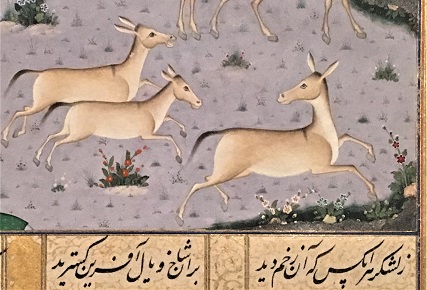Then he heard of a city ruled by activity of the Evil One, where adoration of idols was a non-stop festival and the people rejoiced in sacrilege. Alexander braced his loins with the preparation of the Gospel, charged up to their celebrated temple and set fire to it, and pulled it down with godlike power. The prize was his, nor did he decamp from it, but made his seat there in the temple.
The people of the place were apoplectic, and they raced up to put him to death, but at a blast of discourse from the man their tempers withered, and they retreated. The protecting grace of God was at work, as Alexander let out the apostolic cry: "I am a man who suffers as you do, and have wasted time like you on useless things. Flee eternal damnation. I recommend to you the kingdom of heaven." And things went on like this, and from all harms that they attempted the noble athlete was safe.
Then citizen Rabbula—a city father, thanks to his powers of wealth and rhetoric, who went on to become a denouncer of idols and a herald of the truth, but was then a raving idolater and a henchman of the Devil—addressed the mob in a loud voice: "Brothers! Fathers! Abandon we not the gods of our fathers, but let us complete our sacrifices according to tradition. The gods remain aloof from this Galilean who damages them. If they do not defend themselves, it is due to humanitarian reasons, or to the greatness of the Christians' god."
Encouraged by his mastery of the mob, and benighted by the Devil's every wile, Rabbula told them, "I shall go up to him by myself, and purge our temple of his magic and deceit, and right the wrongs he has done to our gods and to all of us." And he went up full of bluster, and engaged Alexander in dialogue. [....] He said, "I am eager to learn the full extent of your mania. What impels you to keep up this abuse of our gods? It has us dumbfounded."
The blessed Alexander heard his words, and said, "Listen to the power of our God and the mystery of our faith." He went on to speak of God's good will toward men, and the power of the holy scriptures, beginning from the creation of the universe up until the investiture of the cross. All that day and all that night, the dialogue went back and forth between them, and they kept themselves from food, and did not give themselves to sleep....
Rabbula chortled and said to the blessed Alexander, "If these things are true, and your God is, as you describe him, so attentive to his servants, then pray to him for fire to come down right in front of us. If that happens, I will declare that there is no god but the god of the Christians—since, as you say, you are his servant. But your scriptures are in truth falsehoods."
The blessed Alexander had no doubt that God would assent to his request, since it is written that "All things are possible to one who believes." He said to Rabbula, "Call on your gods, since there are so many of them, for fire to come down. I too will call on my god for fire to come down, and set alight the woven mats that lie before us."
"I lack the authority to do so," said Rabbula. "You go ahead."
At this, the holy Alexander arose, boiling over with the spirit, and said, "Let us pray." Facing east, with his hands outstretched, his prayer was such that Creation was set in motion, and fire came down and ignited the mats placed round the temple, just as the noble athlete had said. The men were unharmed, but Rabbula was overcome with wonder, and, thinking he would be ignited also, fell to the blessed Alexander's feet and did not let go until the fire had subsided, saying then in a loud voice: "Great is the god of the Christians!"
From The Life of Alexander the Sleepless (II.9-11, 12, 13)







